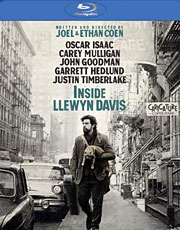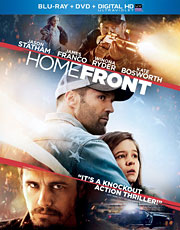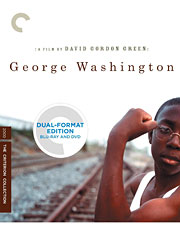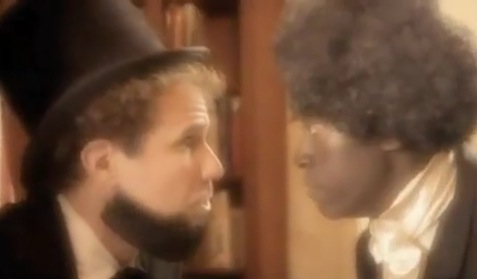Blu Tuesday: Inside Llewyn Davis, Homefront and George Washington
Every Tuesday, I review the newest Blu-ray releases and let you know whether they’re worth buying, renting or skipping, along with a breakdown of the included extras. If you see something you like, click on the cover art to purchase the Blu-ray from Amazon, and be sure to share each week’s column on Facebook and Twitter with your friends.
WHAT: A week in the life of struggling folk musician Llewyn Davis (Oscar Isaac), who’s trying to make it as a solo artist after his former partner commits suicide. With no steady income or plans for the future, Llewyn spends his days wandering the city in search of his next gig and his nights crashing on friends’ couches.
WHY: There aren’t many directors that can boast a track record as impressive as the one that Joel and Ethan Coen have enjoyed throughout their 30-year careers, and “Inside Llewyn Davis” is just another notch on that cinematic belt. Markedly different from a lot of their films in that it’s a much more intimate, character-driven piece, “Inside Llewyn Davis” most closely resembles “A Serious Man” in both tone and execution. Structured more like a loose series of vignettes than anything resembling a plot, much of the movie rests on Oscar Isaac’s shoulders, with the actor delivering a superb performance that manages to make the titular freeloader somewhat likeable. For as good as Isaac is in the role, however, it wouldn’t be nearly as effective without T-Bone Burnett’s excellent soundtrack, especially when such a large chunk of the film is dedicated to the musical performances. It’s not often that a soundtrack plays such a pivotal role in my enjoyment of a movie, but it’s certainly fitting considering just how much the Coens rely on music to provide the backdrop of this bittersweet portrait of personal failure.
EXTRAS: The Blu-ray release includes a 40-minute making-of featurette that focuses primarily on the planning, rehearsing and recording of the soundtrack.
FINAL VERDICT: RENT
WHAT: Eager to provide his 10-year-old daughter (Izabela Vidovic) with a normal life, ex-DEA agent Phil Broker retires to a small, idyllic town in Louisiana. But when local drug lord Gator Bodine (James Franco) uncovers Broker’s past as a law enforcement officer, he teams up with a vengeful biker gang to take him down.
WHY: After working together on the “Expendables” films, it’s only natural that Jason Statham and Sylvester Stallone would team up again. But what makes their latest collaboration so unique is that Stallone’s involvement is a strictly behind-the-scenes affair, serving as both screenwriter and producer. Though this neo-Western may sound like every other Statham vehicle on the surface, “Homefront” plays more like a gritty thriller than one of the actor’s typical action movies. That’s not to say that there still isn’t a fair share of action, because it’s one of the film’s highlights, but director Gary Fleder seems more interested in exploring the relationships between his characters than the fight scenes that bridge those moments. The story itself isn’t much better than your average ‘90s action movie, but the cast (which includes Winona Ryder as Gator’s biker-chick girlfriend and Kate Bosworth as his meth-head sister) elevates the material, especially James Franco playing the de facto leader of the criminal swamp gang. This isn’t the first time that the actor has gone against the grain in recent years, but it’s refreshing to see someone of his quality take on a role that’s seemingly beneath him, because it’s the difference between an enjoyable film and another direct-to-video dud.
EXTRAS: There’s a small collection of deleted scenes and an EPK-styled fluff piece with interviews from the cast and crew.
FINAL VERDICT: RENT
WHAT: Over the course of one hot summer, a group of children from a decaying, rural Southern town are forced to make some difficult choices in order to cover up a tragic accident.
WHY: It’s amazing that the same man behind such stoner comedies as “Pineapple Express” and “Your Highness” was responsible for a movie like “George Washington,” because they couldn’t be any more different. David Gordon Green’s directorial debut falls more along the lines of a Terrence Malick film in both style and execution – an irritatingly slow and pretentious cinematic poem that desperately tries to find a deeper meaning in its lyrical imagery. But while the movie’s gorgeous visuals do a great job of portraying the distressed state of the town and its characters, Green fails to deliver a compelling story, instead opting for a non-linear narrative that lacks focus or coherency. The whole thing is terribly dull, and it doesn’t help that the acting (with the exception of Paul Schneider) is every bit as amateur as its cast. “George Washington” is the kind of movie where a bunch of kids (and seemingly uneducated ones at that) wax poetic about philosophy and life like they’re graduate students, and it’s in this attempt to project a false maturity onto his characters where Green fails the hardest.
EXTRAS: There’s a veritable treasure trove of material here, highlighted by an audio commentary with director David Gordon Green, cinematographer Tim Orr and actor Paul Schneider. The Blu-ray also includes two student shorts by Green (“Pleasant Grove” and “Physical Pinball”), a 2001 Charlie Rose interview, Clu Gluager’s 1969 short film “A Day with the Boys” and more.
FINAL VERDICT: SKIP
You can follow us on Twitter and Facebook for content updates. Also, sign up for our email list for weekly updates and check us out on Google+ as well.
Posted in: Entertainment, Movies
Tags: Blu Tuesday, George Washington, Homefront, Inside Llewyn Davis, new Blu-rays















